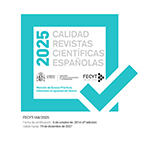La preocupación social por el cambio climático en España: una aproximación cualitativa
Resumen
Utilizando datos cualitativos proporcionados por diez reuniones de grupo, insertos en una investigación sobre Incertidumbre y Cambio Climático en España (2018-20), este trabajo aborda el problema del relativo déficit y la ambivalencia de la preocupación de la sociedad española sobre el cambio climático. Las reuniones se han realizado entre población lega, no experta en materias relacionadas con el fenómeno. El análisis del material discursivo producido reconstruye la compleja semántica del cambio climático y el modo en el que se configuran los que denomina ejes del saber y del hacer. Ejes en el que quedan representadas las distintas posiciones posibles de la sociedad con respecto al cambio climático y estructuran la preocupación sobre sus polos: ignorancia/certeza e impotencia/potencia. En el marco de esa relación, distingue variantes de la preocupación climática; mostrando como hegemónica la variante ambivalente de la Preocupación Despreocupada. Hegemonía frente a las posiciones más netas de la Preocupación o la Despreocupación, así como las que hemos denominado Irresponsabilidad de los Prepotentes y Clarividencia Trágica. Sobre esta estructura estática, destaca la presencia de un aspecto dinámico, que los grupos denominan concienciación.
Descargas
Descarga artículo
Licencia
La revista Política y Sociedad, para fomentar el intercambio global del conocimiento, facilita el acceso sin restricciones a sus contenidos desde el momento de su publicación en la presente edición electrónica, y por eso es una revista de acceso abierto. Los originales publicados en esta revista son propiedad de la Universidad Complutense de Madrid y es obligatorio citar su procedencia en cualquier reproducción total o parcial. Todos los contenidos se distribuyen bajo una licencia de uso y distribución Creative Commons Reconocimiento 4.0 (CC BY 4.0). Esta circunstancia ha de hacerse constar expresamente de esta forma cuando sea necesario. Puede consultar la versión informativa y el texto legal de la licencia.











